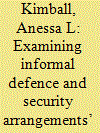| Srl | Item |
| 1 |
ID:
072700


|
|
|
|
|
| Publication |
2006.
|
| Summary/Abstract |
Existing research on the connection between alliance formation and conflict initiation has explicitly focused on the direct effect of alliances on conflict by including some measure of alliance behavior as an independent variable in models of conflict behavior. Existing research misspecifies the relationship between alliances and conflict, because alliance formation and conflict initiation are shaped by many of the same factors (in particular, regime type and capabilities), and alliance formation decisions are endogenous to conflict initiation decisions. Thus, alliance formation and conflict initiation should be modeled in a system of equations where a set of variables shapes alliance formation and conflict directly, and indirectly affects conflict through the decision to ally. The author estimates a two-equation probit model that accounts for the endogenous nature of alliance formation decisions and, thus, for the indirect effects of variables like regime and power on conflict. Results suggest that the effect of regime on alliance behavior differs across time periods. Finally, the model provides evidence that the total effects of variables like power and regime on conflict are, in fact, mediated by how those variables influence the decision to ally.
|
|
|
|
|
|
|
|
|
|
|
|
|
|
|
|
| 2 |
ID:
155773


|
|
|
|
|
| Summary/Abstract |
This article presents and examines a model of legalization on an original dataset of informal Canadian–US defence and security arrangements (DSA) formed between 1955 and 2005. Non-treaty arrangements permit US presidents to bypass Senate ratification, resulting in expediency and secrecy, both assets in defence and security relations. That withstanding, informal arrangements contain provisions responding to certain strategic problems. They detail aspects of legalization: delegation; obligations; and precision. Leaders select informal arrangements to incur fewer public commitments, but design them to ensure credibility. In that context, what factors shape informal DSA legalization? Propositions developed from delegation and rational institutionalist arguments identify the factors influencing informal DSA legalization. The Canada–US case is germane due to its “rules-based” nature and heterogeneity. An original dataset of the legal design of eighty-two bilateral DSA is introduced and analyzed. Results confirm cabinet shuffles and unified governments decrease DSA legalization while Democrat presidents and rising military threats increase it.
|
|
|
|
|
|
|
|
|
|
|
|
|
|
|
|
| 3 |
ID:
098411


|
|
|
|
|
| Publication |
2010.
|
| Summary/Abstract |
Existing work cannot explain why countries form alliances when direct security threats are not a key political issue, though we know countries routinely do engage in that behavior. Countries form alliances to manage the essential problem that they must use finite budget resources to provide social policy and national security; the 'guns versus butter' dilemma. States ally to 'contract out' national security via the formation of alliance contracts so they can allocate more resources to domestic concerns. Alliances increase the efficiency of security policy by providing the same level of security with fewer resources, thus freeing those resources for use in other domains. Not only should alliances form when security threats do not dominate the political agenda, but also domestic political and economic demands will influence alliance decisions. In positing a domestic politics-based explanation for alliance formation, this article argues that increased demands for social policy goods increase the chances of alliance formation as leaders seek greater policy allocation efficiency. The use of a production possibilities frontier illustrates the central argument. Those claims are examined on a sample of all country-years from 1816-2000 using a probit model. Empirical results suggest changes in the demand for social policy goods, operationalized as changes in the infant mortality rate, are an important cause of alliance behavior.
|
|
|
|
|
|
|
|
|
|
|
|
|
|
|
|